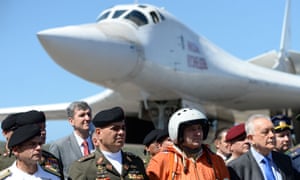Venezuela welcomes Russian bombers in show of support for Maduro !!!
Russia has landed two nuclear-capable “Blackjack” bombers in Venezuela as part of a joint training exercise experts say is designed to showcase Moscow’s growing military prowess and shore up the position of Venezuela’s embattled president, Nicolás Maduro.
The Tu-160 planes touched down at the Simón Bolívar international airport near Caracas on Monday morning, according to Venezuelan state media.
Russia’s defence ministry said the strategic bombers – used during the country’s campaign in Syria – were part of a larger fleet also including an An-124 military transport plane and an Il-62 passenger jet that had flown more than 10,000km to Venezuela.
Venezuela’s defence minister, Vladimir Padrino López, said the arrival of the aircraft for joint manoeuvres was not intended as a provocation. “We are makers of peace, not war,” he was quoted as saying by the state broadcaster Venezolana de Televisión (VTV).
Russia’s ambassador in Caracas, Vladimir Zaemskiy, told VTV the deployment reflected the “very fruitful” military partnership that had developed since the relationship was forged by Venezuela’s late leader Hugo Chávez in 2005.
However, specialists say the move – which follows a three-day visit to Moscow by Maduro last week – is designed to signal to Washington that Caracas is not without international support.
Earlier this month the US defense secretary, James Mattis, described Maduro as an irresponsible despot who was leading his country into ruin and would ultimately “have to go”.
Last year Donald Trump told reporters there were “many options” to resolve the Venezuelan crisis, before adding: “And by the way, I’m not going to rule out a military option.”
“Russian military exercises involving Venezuela are not new, but the timing is suspect,” said Harold Trinkunas, a Venezuela specialist at Stanford University.
Trinkunas said the deployment was “most likely a signal of support for the Maduro regime at a time when both Russia and Venezuela are experiencing increased tensions with the United States”.
“Russia has also been keen to exercise its long-range military capabilities in recent years, and such a visit to Venezuela fulfils that function as well,” he added.
For Maduro the visit was designed to underline that he did enjoy some “external support vis-a-vis the United States and its sanctions” as well as seeking to highlight Venezuela’s geopolitical relevance.
Maduro, who blames his country’s economic collapse on a US-driven “economic war”, returned from his trip to Russia touting $6bn in investment and deals designed to shore up Venezuela’s crumbling economy.
He lashed out at the US on Sunday night, claiming a White House-backed coup attempt was afoot designed to “disturb Venezuela’s democratic life”.
Venezuela’s president offered no evidence to back up his claim but promised to reveal further details at a future press conference.
Since you're here…
… we have a small favour to ask. Three years ago we set out to make The Guardian sustainable by deepening our relationship with our readers. The same technologies that connected us with a global audience had also shifted advertising revenues away from news publishers. We decided to seek an approach that would allow us to keep our journalism open and accessible to everyone, regardless of where they live or what they can afford.
More than one million readers have now supported our independent, investigative journalism through contributions, membership or subscriptions, which has played such an important part in helping The Guardian overcome a perilous financial situation globally. We want to thank you for all of your support. But we have to maintain and build on that support for every year to come.
Sustained support from our readers enables us to continue pursuing difficult stories in challenging times of political upheaval, when factual reporting has never been more critical. The Guardian is editorially independent – our journalism is free from commercial bias and not influenced by billionaire owners, politicians or shareholders. No one edits our editor. No one steers our opinion. This is important because it enables us to give a voice to those less heard, challenge the powerful and hold them to account. Readers’ support means we can continue bringing The Guardian’s independent journalism to the world.




Post a Comment